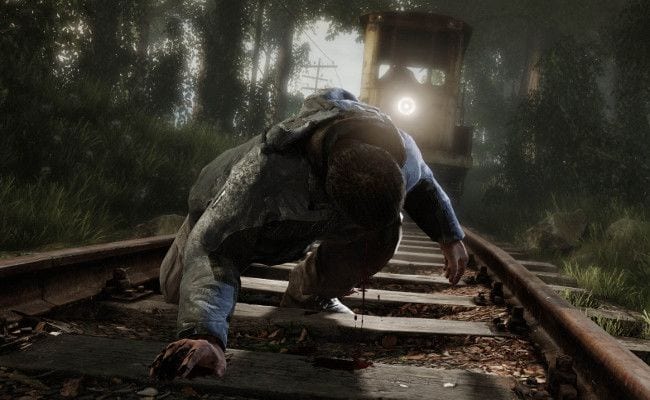
The Vanishing of Ethan Carter is a game about stories. A young boy named Ethan Carter, who spends much of his time writing weird Lovecraftian fiction stories, has apparently stumbled on something ancient and evil in his own hometown and has gone missing. The player takes on the role of a psychic detective called Paul Prospero (aptly named after the protagonist of Shakespeare’s The Tempest, a character associated with writing and with the ability to directly contact the spirit world) and directs him in his quest to locate Ethan.
The game itself is focused on exploration and puzzle solving in a rather beautifully rendered rural environment. The game rewards patient and thorough examination of the world, as the isolated nature of Prospero’s investigation only really allows the story to be advanced through environmental storytelling and through reading the occasional scrap of newspaper or story left behind by Ethan himself.
The game is also a horror game, though most of that horror is derived from an eerie sense of dread created through the atmosphere that is established through the presence of the alien and the weird in an otherwise familiar environment. There are few outright scares to be had here. Instead, Ethan Carter prefers to tease the player with the implications of that which is strange.
The game’s interest in exploring the nature of fiction and how it estranges us from the world at the same time that it lets us express ourselves about things we might be afraid to normally confront is actually largely mirrored in the gameplay itself. Most of the puzzles here concern mini-investigations in which the player must locate clues in the environment and then psychically reconstruct the events that took place in several locations. This psychic reconstruction largely concerns establishing a chronology between various pieces of physical evidence that suggest prior events. Once Prospero establishes this chronology, a psychic reconstruction of those events allows him to essentially view a cutscene that reveals what happened in the past.
In a strange sort of way, the game reminds me of the horror classic, The Seventh Guest, a game that motivated the player to solve puzzles throughout a haunted manor in order to witness cutscenes that revealed the plot of the game a piece at a time and not necessarily in sequential order. Piecing together what has happened to Ethan and his family is the chief interest of the game. However, the puzzles here are, for the most part, fairly easy to solve (not the mind bendingly difficult puzzles of The Seventh Guest). The developers want the game to focus on the idea of reconstructing and narrativizing the past, not in holding up that process through frustrating the player with obscure puzzle mechanics.
That being said, the game comes out and explains that it is not a game that wants “to hold your hand” on the very first screen after you hit “Play.” While I have described the main bulk of the nature of Ethan Carter‘s puzzles, there are a few more varied types and the truth is that how you play and how all of the puzzles work is not made immediately apparent in the game. Indeed, what I think is the weakest puzzle in the game, the one that probably most players will start with, is one that doesn’t seem to present itself initially as a puzzle at all. It is easy to skip past such puzzles if you don’t take the time to fully explore the world of Ethan Carter, so playing slowly and methodically is the best route to take and becomes a really pleasurable experience.
However, the game’s conclusion did not immediately resonate with me. The revelation of what Ethan’s situation is seemed a little underwhelming at first. However, after considering how that revelation relates to all of the memories that Prospero has reconstructed throughout his investigation, I realized how cleverly the game goes about establishing a direct connection between what you discover through gameplay and the real truth about the nature of Ethan’s vanishing. The game is smart about linking these psychic events to the psyche of the titular character himself. As such, it tells a smart story about, well, the nature of stories.
Ethan Carter is soulfully constructed and its atmosphere is easy to get immersed in because of the detailed craftsmanship of the world. It is simple and fairly straightforward once you grasp how its various mechanics work, and it’s also one of the better games that I have played this year.

